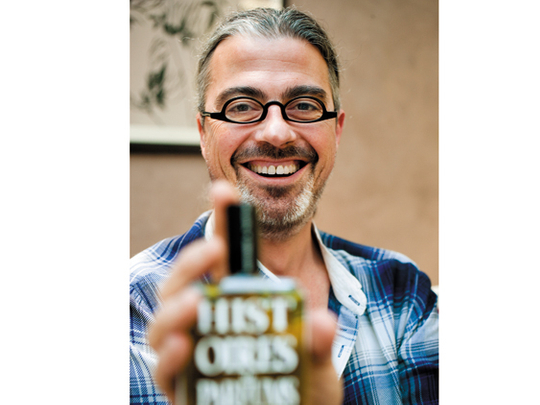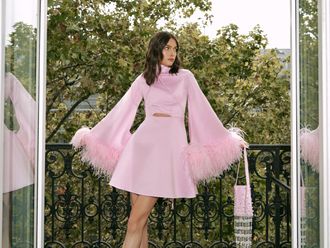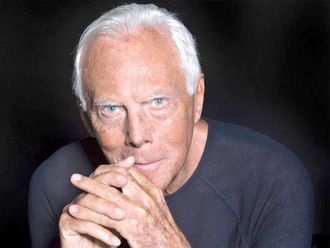
Conveyed via an email interview in his charmingly Frenchified English a few days before his arrival in Dubai to launch his perfume range, Tubereuses (Tuberoses in English), this image is as evocative as the scent of orange blossoms.
A week later, meeting him in a designated area in Saks Fifth Avenue at BurJuman provides another image. Of a grown-up man with a salt-and-pepper ponytail, with a tall, lanky built, charming as the French usually are and with an excess of energy he wilfully does not put a leash on. He speaks with gifted artlessness. He laughs a lot (uproariously at that) and keeps looking for the right words in English every now and then, cocking his head to one side, clicking his fingers and going hmmmm for a while as though to silence his native French from intervention. There is no use of whatchamacallits with Ghislain because he is too much of a perfectionist. And he is happy for you to grapple with the paradox he presents: a perfectionist who is also an incurable dreamer.
"I was a solitary child and a dreamer. I still am. I used to observe the world around me, people, landscapes, colours, life in the streets. Very early on in life, I began to tell myself stories and I have never stopped," he says.
What kind of stories? "All kinds. As a dreamer, I imagine something is going to happen…. For example, as a child I'd be Santa Claus in my mind, I would play games and dream that I am winning but sometimes I'd also dream that I am losing but I didn't care. For me the pleasure comes from the fact that I am always dreaming about something. It's also about imagining the future even if it does not turn out the way I have imagined it. I don't care."
It's the reason why he has never been disappointed in life. What would disappoint him though is if he were to "stop imagining at all!"
As a child who moved from south of France to Morocco (where the orange blossom brioche fragranced his life forever) and back to France when the political climate in Morocco changed, he has lived a busy but peaceful life, in complete contradiction to the tumult that teenage years can bring. He is certain that his dreamy disposition is what sheathed him from the vagaries of teen temptations. His pragmatic self, stubbornly independent of his dreamy alter ego, however egged him on to be self-reliant at 13 when he took up his first job at a small restaurant in Morocco. As he puts it, "I am less wise today than I was at that time! I was a teenager who was in the constant company of adults so that rubbed off on me. I was working like an adult [at the restaurant] but I was also eating all the sweets when business closed for the day. So at 13, I was like an adult with children and like a child when I was with adults!"
Back in France, he continued his stint at restaurants, earned enough to pursue his dreams and developed what he highlights as an ‘epicurean' streak that eventually overtook his tastes at the speed of lightning. "I always had a taste for beautiful things and luxury. Because I earned money very early, my goal has been to enjoy all the pleasures of life."
At 20, he decided to join a catering school in Paris. "When you are in the restaurant business, at least in France, everybody wants to go to Paris to finish their studies." Even though he is a chronic ‘wonderer' and a ‘wanderer' as he likes to remind you with a resounding laugh, he is not self-obssesed to the point of providing an explanation for what he feels is his natural progression in life. "It's all a matter of opportunities and chances in life, says Ghislain. "Maybe if I was born in Detroit, I would have launched myself into car designing but I don't think that would have led me to perfumes!"
Inspiring the storyteller in him
And at present he is completely lost in the world of perfumes. But first, his love for the world of food during childhood urged him to join a culinary school, pass with flying colours and set up two restaurants in Paris, which are still running successfully. His love for perfumes was not an epiphany. Far from it.
"As a child living in the south of France, during holidays we (his sister, brother and parents) went to the Grasse museum of perfumery. Grasse is a village in South of France where the French art of perfumery was born. All of this little city is tinged by tincture, perfumes and smells. At this time I knew that perfumes were going to be the perfect way for me to translate my emotions, my imagination and all my dreams some day. I am a storyteller and perfumes give me the opportunity to tell them."
And so it was that he enrolled at ISIPCA (Institut supérieur international du parfum, de la cosmétique et de l'aromatique alimentaire), a school for postgraduate studies in perfume in Versailles, France.
"The most important things I learnt at the ISIPCA weren't the technical stuff or the smells but a scent's vocabulary. I learnt to describe a scent with words and very quickly, I was able to describe an image with scents. And in the end I learnt to tell a story with a perfume."
It's, he says, a special vocabulary that is shared between a creator and a perfumer. "For instance, "When I say ‘crisp', my perfumer will understand." But ‘crisp' will not mean the same thing to two different perfumers. For Ghislain crisp is citrusy, to name but one attribute. He offers another example. "Patchouli has a dark side but also a clean side. But that's according to me. The dark side is deep, sensual, the clean is uplifting, crisp." And unlike the charming lapses he settles into so well while seeking his way from French to English, his grasp of perfume vocabulary is clear, precise, nearly didactic. "It's not a one-word vocabulary," he says. "It's several words. You need to learn how to speak of a perfume. It is a unique language. The vocabulary, its meaning and interpretation can change from one creator to another. It also depends on the lab you are working with. It's more a question of the chemistry between two personalities, the creator and the interpreter." His lab mate is a Spanish lady, and the two communicate in Spanish (a language he is adept at) and "what I say is what she understands. This equation is invaluable. It's a synergy that ends up as the perfume."
His irreparable dreaminess as his core ideology and his artless charm are however left outside the lab when he is in the process of creating his perfume. What subsumes him inside the lab is his vision and words, context and perfectionism. Here, he is in complete control. "I do exactly what I want. I tell them exactly what I want. It is totally my call. My vision."
The ‘best gifts' in Ghislain's life
Once out, he turns into a dreamer again and as he lopes into office and tells his team, "I've got an idea', and they go, ‘Oh no, not again, not again, Gerard, stop it, stop it..." He is off again laughing, making the atoms in the air collide.
"When I am working on a new project, I am very enthusiastic, fully into it but as it is nearing completion, I am already on to my next dream. I am never fully satisfied with perfection, I feel like doing more."
But dreamers are disarming too. He talks of how his four children (aged between 13 to 23), whom he calls his ‘best gifts' in life, are constantly worried for him and his overcharged imagination. "It's a problem [for them]," he admits. "When I tell them I want to do this or that or that, they say, ‘Stop! Don't think so much because you are going to be disappointed'. The funny thing is, I am never disappointed; it's they who are disappointed when what I set out to do does not happen. I can understand their concern."
But, almost as an inevitability after every such encounter, he loops back into the need to dream. Despite the concern of his loved ones, which he truly appreciates, he cannot help being astonished by what happens to him a dozen times a week at least: "I ask my friends, ‘What are you thinking?' and they say ‘Nothing'. I am amazed. How can you not be thinking all the time? And I say to them, ‘Oh, you are such bores!'" Then he smiles, stretches his lanky frame to fit another groove in the sofa and gives some slack, "For some people it can be tiring (all this thinking) so it's not for everybody."
But he is on a single track despite his concessions to others' pursuits and different values. "In life everything make me wonder. I am without a doubt a wanderer and a wonderer. I draw my inspiration during travels to New York, Dubai, Barcelona, Paris... I am always wandering in those big cities, feeling their beauty and strength. But I think the most important thing is to stay a wonderer in everyday life. I keep my eyes wide open even in a familiar street of Paris, because you never know - there's always something to learn!"
Histoires De Parfums was launched by Ghislain in 1999. Though it is only ten years old, the epic-proportion passion he has invested in it could rightly help it claim a far more mature ancestry. And as in vintage values that are just as driven by emotion and dreams as they are by monetary value, Ghislain is not too preoccupied by the dollar deluge his venture brings him. "I am not a businessman. I think I am a creative entrepreneur. My goal is to create a product and put it out on the market but not think about profit as the driving force. Of course I need to have a business sense to be able to market my creations but what's more important is to give to people what you want to give. I am not doing this for the money. "Today I am passionate about perfumes because I have the impression that it's an unlimited area; however, I may want something else tomorrow. It's true I am insatiable, I want forever more and am never completely satisfied with anything in life except for my four children. At 40, I realise nothing matters to me more than them. But what is important to me is that I keep dreaming. It's not important that the dream comes true."
For a man who is so passionate about creating things, he has a very penetrative insight into the ephemerality of creation and the danger it carries in its womb - deluding you to its seeming permanence. Which is perhaps why his penultimate statement as the interview concludes is, "If your perfumes don't work, your dreams don't die." And the ultimate: "To me the most important thing in life is to dream because when I dream, I feel really alive."
Notes From a Dreamer
- I don't think a day of sensory overload will come soon in my life.
- Perfume and food co-exist in two ways: the sense of smell and the sense of taste are linked. We talk about Proust Madeleine for the olfactory sense but the gustatory memory is as important, like the memory of music. I think all the senses are linked and with food and perfume, you can touch all. I add aromas in my perfumes because I am a cook and an epicurean.
- To me a perfume is not romantic. Sometimes, it can become romantic, depending on the way a person wears it and why she is wearing a particular perfume at a particular moment. With my creations, I am telling stories but the person who is perfumed with my fragrance can rewrite her own story.
- The way people read perfumes and scents is very intimate; a perfume that can be rich in temperament for someone doesn't mean anything for another. There is a lot of reminiscence in the love of scents.
- I think that perfume is the only free art. Aside from marketing diktats, everyone is free to make their own choices.
- To pay attention to scents is a state of mind, your spirit is always aware of the smell - bad or good. You have a library of smells in your head and it's very rich. It gives a new vision of the world around you.
- With my perfumes, I hope I have created a state of mind, imagination, creation, day dreaming and mystery.
- A perfume is not a matter of perfection because a perfume can always evolve, it's always more perfectible. Like an oil painting which can be painted over several years to end up as a picture, it's the same with a perfume.
- The perfumed state of mind has no limits.
Tubereuses
"Tuberose is the queen of the flowers in perfumery and the hardest to work with. As a pure essence, it is terrible to smell. The first time I smelt it during my training at ISIPCA, I hated it. Two years ago, I smelt the essence again and this time I found the scent very interesting.
I read a lot on this flower and discovered it was difficult to tell only one story about it because it is complex and very, very capricious. It has to be handled with extreme care, stored in a particular way, it can't be planted too often in the same soil, it's highly moody but a beautiful creation of nature... and that's why I decided to create this trilogy.
The number one
The vision I had for this fragrance is the brown side of the bulb. The result is a powdery perfume, a little heavy like in the natural tuberose.
The number two
This scent is a more transparent tuberose, more innocent. I dressed it with other white flowers like jasmine, frangipani and tiara. A creamy but vaporous perfume.
The number three
I thought about a wild, animal fragrance with some notes of dry herbs.
The Collection
1725 Casanova (Enough has been said on Giacomo Girolamo Casanova, a scholar, banker, infantryman, magician spy and a diplomat among other things who always was proud of his Venetian origin. Notes of amber fern, fine wooded tunes and touches of lemony freshness, lavender and heady spices.)
1740 Marquis de Sade (Original name was Donatien-Alphonse-Francois. A libertine, the fragrance is a spiced wooded scent, rounded with patchouli among other notes.)
1804 George Sand (On 1st of July, at No 15, rue Meslay in the 3rd ardt of Paris, Amantine Aurore Lucile Dupin was born. She became a famous writer using an androgynous pen name, George Sand. A writer of genius, she was modern in the most contemporary sense of the word. The fragrance captures her spirit in sandalwood, patchouli, heady spices and sweet fruits.)
1826 Eugénie de Montijo (The last French empress, she was born in Granada, in Andalusia. A sparklingly beautiful woman, this fragrance captures her spirit with notes of patchouli, amber and vanilla.)
1828 Jules Verne (He was born in Nantes when discoveries were the essence to living. "It's more of a quality a guy has to have. Sporty, adventurer of a certain temperament." The scent is like a marine breeze over a wild heath. Fresh yet sophisticated.)
1873 Colette (Sidonie Gabrielle Colette was a writer who lived surrounded by rose and field flowers. Freshness, unsettling white flowers, sparkling, tangerine and lemon notes.)
1876 Mata Hari (Real name Margaretha Geertruida Zelle, born of a Dutch father and a Javanese mother. She went on to became a famous spy while retaining her allure and exoticism. "In my mind, Mata Hari was ‘extravagant'. A blooming rose bouquet, it has a touch of spice.")












